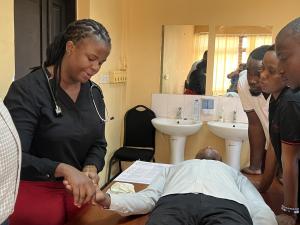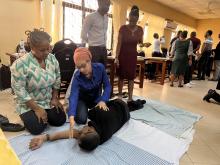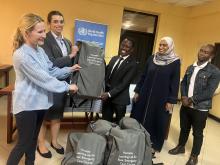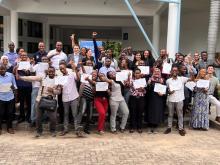Delivering Basic emergency care with confidence
Dar es Salaam: What started as a calm and regular shift for Dr Iddauha Mohammed, a young surgeon in Same District hospital in Kilimanjaro Region, swiftly turned into a state of emergency, when a road traffic crash patient was rushed into the health care facility.
*Clement Tsai*, 43 years old, had just arrived in an ambulance having endured a motor cycle crash. Dr Iddauha who met and examined him saw that the patient was a polytrauma case and needed to be transferred to the zonal hospital, which is about 106 kilometres away with an ambulance. He immediately performed basic emergency care (BEC) including early management of bleeding, resuscitation, immobilization and administered critical medications.
“When the patient finally arrived from the district hospital to the regional hospital, we were so alarmed initially but later got relieved. Had it not been the basic emergency care performed, this case would have been a more critical case.”, noted Freda Shayo, Doctor at the Kilimanjaro Christian Medical College.
Every day around the world, people of all ages seek emergency care. Emergencies such as injuries, infections, heart attacks, strokes, and acute complications of pregnancy and chronic disease affect adults and children. In many resource-limited settings, patients with an emergent condition who can access a hospital are likely to be met with limited, ineffective, or non-existent emergency care. Most first contact providers at first level hospitals treat emergency conditions without the benefit of dedicated emergency care training or certification pathways.
To ensure timely provision of basic care to patients with life threatening condition and reduce mortalities, the World Health Organization (WHO) in collaboration with the Ministry of health rolled out the basic emergency care training across the country in 2016. To date more than 3171 BEC providers and 270 trainers have been capacitated and certified for the provision of emergency care services.
In 2021, Dr Iddauha Mohammed and Frida Shayo were among a group of 50 health workers who participated in WHO’s Basic Emergency Care training in Kilimanjaro. “Before, we use to lose 3 to 4 patients in a month, but delivering the basic emergency care to our patients has been saving a lot of lives; and has boosted confidence of we health care workers. We are delivering health care service regardless of the emergency with so much confidence now”.
To improve access to this training, WHO with the Emergency Medical Association of Tanzania (EMAT), hosted the first ever Basic Emergency Care (BEC) hybrid course pilot with 22 first contact health workers. The course included an in-person practical skills training, preceded by a self-paced online program. Participants learned initial assessment and management of acute illness and injury, becoming certified BEC providers.
Dr Charles Sagoe-Moses, the Country Representative of WHO Tanzania, praises the basic emergency care transformation in Tanzania, “The goal has always been leaving no one behind. The timeliness of the basic emergency care and its benefits cannot be overemphasised. Scaling it up is the way to go, this hybrid approach is extremely relevant especially as it is part of the lessons from COVID-19 pandemic experience. I urge everyone to take advantage of this” he says.
The hybrid course aimed to optimize the resources needed for an in-person session and reduce the time health workers are away from their clinical responsibilities. This aligns with the EMAT target of empowering over 1600 basic emergency care providers in the year 2024.
“We extend our gratitude to WHO for this innovative approach, which will significantly enhance the accessibility of essential life-saving skills to healthcare providers everywhere and anytime”.
*Clement Tsai* is back on his feet, like many others who have benefited from the BEC interventions. With the new BEC Hybrid introduction, many more lives will be saved as many health workers will be trained. Both approaches of the BEC Hybrid and face to face course will play a pivotal role in achieving this goal.
The BEC Hybrid is expected to be rolled out in other countries after a successful pilot in Tanzania
For more information on the BEC course, visit www.who.int/emergencycare .
*Name changed to protect identity
Communications Officer
WHO Country Office, United Republic of Tanzania
Tel: +255 744377899 (Phone)
Email: adjeidum [at] who.int (adjeidum[at]who[dot]int)
Tel: +255 754 287 875
Email: sagutig [at] who.int (sagutig[at]who[dot]int)



